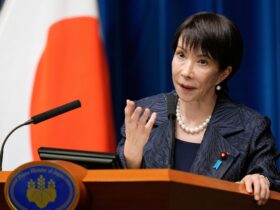On July 14, the US President and the Israeli Prime Minister signed the Strategic Partnership Joint Declaration in Jerusalem. In this statement, the US “further affirms the commitment to work together with other partners to confront Iran’s aggression and destabilizing activities”.
Two days later, The US President stated in the speech held at the Gulf Cooperation Council: “We will not walk away and leave a vacuum to be filled by China, Russia, or Iran.”
One of those places, where Biden fears to “leave a vacuum”, is the state of Iraq.
And the “vacuum” is filled with a resource that itself is a global matter of conflict these days: oil. According to BP’s Statistical Review of World Energy report for 2022, Iraq produced with over 4 million barrels of oil daily approximately 4.6% of global production.
A specifically contested region within is Iraqi Kurdistan, the region established following US wars against Iraq and anchored in the Iraqi constitution as autonomous region – a constitution guided by US experts such as Paul Bremmer again after US occupation.
The region produces 500 thousand barrels of oil per day – 10 percent of Iraq’s total and a small share in global output. But in the current global oil crisis, its monthly production equals to one third of the strategic reserve the United States has released to ease the oil price.
Iraqi Federal Court cancels KRG’s legislation
The distribution of that oil income has long been a matter of conflict between Bagdad and Erbil, the region’s capital city. With a February 2022 of Iraq’s Federal Court, the conflict has reached new level.
The court ruled that the Kurdistan Regional Government’s (KRG) law of regulating the oil and gas industry, dating from 2007, was unconstitutional. The court demanded that Kurdish authorities hand over their crude supplies over to the Iraqi national oil company. KRG authorities rejected the ruling.
Since then, the conflict erupted further. Bagdad threatened to cut Erbil’s share of the federal budget. The KRG meanwhile developed plans to further export oil and gas to Europa, substituting Russian and potential exports. Such a move would be an independence referendum in all but name, complementing the 2017 referendum, which to date remains a paper exercise, as some argue. But the KRG’s efforts received huge blows both from Bagdad as well as Iraq’s neighbors.
Repeated attacks on oil and gas fields in KRG territory
In March, Iranian Revolutionary Guards reportedly attacked the mansion of a Kurdish oil tycoon. The organization claimed to have attacked strategic Israeli centers. The KRG has long been one of important oil suppliers of Israel. In April, several Katyusha rockets landed near an oil refinery in the Khabat district of Erbil. Kurdish authorities blamed Iran-backed militias for the rocket fire. In June, the Khor Mor gas field in the KRG, which produces 80% of all locally consumed gas, was attacked with rockets.
The Iraqi government meanwhile prepared to execute the court decision. On May 7, Iraq’s Oil Minister Ihsan Abdul Jabbar said that the ministry would start to lay the foundations for a strong federal state that runs its oil activity based on scientific standards. The Minister announced the creation of a new, state-owned oil company by Baghdad that enter into new service contracts with oil firms currently operating there under the Kurdistan Regional Government (KRG), according to a statement.
Iraq threatens international oil companies
In June, the Oil Ministry called international oil companies operating in the KRG to terminate their oil and gas contracts signed with the Kurdistan Regional Government (KRG), otherwise, they will be blacklisted, according to a document seen by The New Arab.
“For those IOCs that already have signed contracts with the KRG, they should terminate them within three months from being informed. In case the companies did not commit to the content of this document, they would be blacklisted and doing business with them will be banned,” reads the document.
Beginning of July, the Iraqi Oil Ministry confirmed that some US companies were already stopping their activities in the KRG. The Ministry declared in a statement “the companies (Schlumberger, Baker Hughes, and Halliburton) (…) confirmed not to submit to new projects in the Kurdistan region in compliance with the decision of the Federal Court and the directives of the steering committee formed in the Ministry of Oil.” The statement highlighted that “the above companies are now in the process of liquidating and closing the existing tenders and contracts.”
US companies start cancelling oil contracts with KRG
In a statement to Al Monitor, Baker Hughes confirmed the decision, saying “Baker Hughes has been committed to supporting Iraq’s energy needs for decades, and we are keen to continue doing so in accordance with local laws and regulations”. Later on, Halliburton joined Schlumberger and Baker Hughes in notifying Iraq’s Oil Ministry that it will comply with a Federal Supreme Court (FSC) ruling invalidating the legal foundations of Iraqi Kurdistan’s energy sector.
But Baghdad moved further. On July 4, a commercial court in the Iraqi capital purported to annul four of Iraqi Kurdistan’s oil contracts. Affected are Norway’s DNO, UK-listed Genel, Canada’s Western Zagros, and the U.S. firm HKN.
30 years of US-Kurdistan partnership threatened
Ahead of Biden’s visit to the Middle East, articles appeared on US press claiming, “Iran’s Threat to Kurdistan Is a Greater Challenge to the Oil Market Than OPEC Quotas” and “American Energy Interests in Iraq Are Under Direct Attack by Iran”.
The author, Matthew M. Zais from the Atlantic Council, stated “The U.S. can no longer allow Iran to erase America’s 30-year security and energy partnership with Kurdistan.”
Indeed, the US President’s visit had the struggle against Iran as a major item on its agenda. But the only visible outcome of Biden’s trip concerning Iraq was the connection of the country’s electricity grid to those of the Gulf countries. This is a step meant to reduce Iraqi-Irani electricity trade and dependency. As far as the Kurdish Regional Autonomy in the north of Iraq is concerned: Washington appears to have already given up the Kurdish region it has created and enshrined in Iraq’s constitution and to which it has provided a lifeline with promoting its oil exports. The regions future, it seems, will no longer decided in Washington or Jerusalem but in Bagdad. And US efforts to Balkanize countries in the Middle East might receive a huge blow, beginning with Syria.

















Leave a Reply